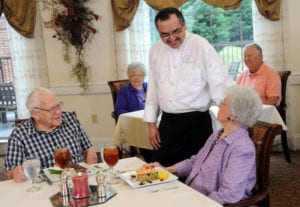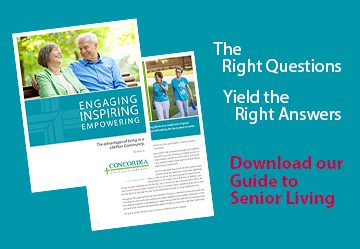New Year, New Options: 6 Things You Need to Know About Senior Living
This news story was originally printed in The Oklahoman.

Ed Herider and his sister. [Photo provided]
Ed Herider’s schedule is so busy that his own sister has a hard time getting a lunch date.
Herider is 78, and lives at Concordia Life Plan Community. Since moving, he has logged more volunteer hours in his community than he can count.
“I have been single my entire adult life and I was quite content, but after moving, I saw so many ways I could impact the lives of others and help my new neighborhood flourish,” he said.
He made the decision to move for one simple reason.
“I wanted to stay in control,” Herider said.
After experiencing what he called a wake-up call, he realized if his health failed him, a host of important decisions would fall on his sister, impacting her and her family. He decided he needed to do something he never thought he would consider: leaving his beautiful home of 36 years.
It was not an easy decision. After all, he was perfectly healthy, and quite capable of staying in his home.
Herider wanted to make a move while he had choices and could be part of the process.
Considering retirement communities
Making the right decision for yourself or a family member requires careful consideration.
Retirement communities come in many different forms, from the traditional model that provides housing and some services — to continuing care retirement communities, which provide increasing levels of care over time including independent living, assisted living, memory care and skilled nursing on one campus.
Healthy seniors make the decision to downsize and transition into these communities because of the ease of maintenance-free living, services such as housekeeping, dining, local transportation, and activities.
Most importantly, always ask questions during your visit, and ask the staff as well as families and residents about their experience, said Julie Davis, marketing director at Concordia Life Care Community. The decision of if, when and where to move lies with you, but here are a few things to consider.
Activities

Activities are a major part of senior living. [Photo provided]
Brad Breeding, author of What’s the Deal with Retirement Communities? and president of My Life Site, said one often-overlooked benefit is that there are many opportunities for resident involvement in so many aspects of the community, whether it is heading a committee, leading a class or arranging volunteer activities.
“There is a dual benefit in that it is valuable to the residents’ overall wellness and it is also valuable to the retirement community, and often the broader community. CCRC residents have a wealth of knowledge and experience to share,” Breeding said.
Moving into a retirement community offers ways to stay active and engaged in life while living within a supportive community atmosphere.
“While there’s plenty going on in the Oklahoma City metro area, you can always find something happening in Concordia’s active adult community,” Davis added.
Health & Fitness
As much as we like to deny it, maintaining an optimal level of wellness in all aspects of life is crucial as we age. Most retirement communities offer a breadth of great wellness options.
“Don’t think of the offerings as ‘old folks’ wellness. The goal is to ensure that residents are living an active, healthy lifestyle through engaging activities, no matter what their current state of health may be. Our residents choose from a robust list of fitness offerings: from personal training, tai chi, and Zumba to Wii bowling – there is something for everyone,” Davis said.
Some senior communities offer onsite medical clinics as well. Concordia has a partnership with Mercy Hospital and offers an onsite Mercy Clinic, staffed by Mercy Hospital.
Downsizing & maintenance-free living
Keeping a home can be hard work at any age, but can be increasingly burdensome as you age. Not only does home maintenance require labor but the cost can also become an issue. A continuing care retirement community offers residents the opportunity to live maintenance free with yard work and housekeeping included.
Some residents who move into the patio homes at Concordia start out handling their maintenance themselves, but as they get older or if they face a health challenge, people are around to help. For those residents who don’t want to deal with yard work or maintenance, those services are included from day one.
Nikki Buckelew, founder and lead listing agent at OKC Mature Moves with Keller Williams Realty Platinum, specializes in helping seniors with their post-retirement moves. She said her team has seen many of Concordia’s residents who chose to downsize experience a renewed sense of vigor and enthusiasm.
“Some enjoy newfound hobbies and others choose to spend time volunteering or traveling. No longer dealing with home maintenance or household chores is a huge relief,” she said.
When the move is done based on the person’s wishes, and doesn’t involve coercion or crisis, it always results in a lifestyle improvement.
“Our clients often tell us that they are either happy they moved together as a couple or retrospectively wish they had. Couples benefit from having each other for support during a transition,” Buckelew said. “They make friends faster and tend to adjust faster when they choose to move together.”
Meals

[Photo provided]
Some of us love cooking, some of us don’t. Retirement communities generally offer meal service available to residents. No more having to plan out your meals, run to the store or clean up – unless you want to.
“People tell me they like to come to our dining room because they like the food. It’s like having a great restaurant in your neighborhood that you can walk to,” said Tony De Lara, chef at Concordia.
Meals are included in the independent living monthly fee.
“It’s not just convenient. It is also good, flavorful, nutritious food,” De Lara said.
Eat at home or sit with friends and neighbors in the restaurant-style dining room. You can even choose to invite your friends and family for a special occasion, catered birthday or anniversary celebration and dine in a private dining room.
Long-term support
Plan for your tomorrows today. Planning for the future before your health declines or something happens. Retirement communities present a level of comfort for both you and your loved ones to help take the stress out of future health care needs.
“Without question I think one of the biggest benefits of a continuing care retirement community is peace of mind – not only for the resident, but also the resident’s family members,” Breeding said.
“Older adults represent the fastest growing segment of our population; yet, at the same time, the ratio of family caregivers is decreasing,” he added. “So the opportunity to have a plan in place for addressing future care needs will only become more valuable, and continuing care retirement communities are obviously one way to do that. It helps remove uncertainty and burden on family.”
Continuing care retirement communities offer a holistic approach to aging. Adults age 62 and older choose to move to these and live independently in a patio home or apartment and are able to come and go and live life as they please, Davis added.
As assistance with activities of daily living becomes necessary, they can transition into the on-campus assisted living community, specialized memory care, or skilled nursing, Davis said.
Financials
If you’re overwhelmed thinking about paying for retirement living, you’re not alone. When considering a community, make sure that you are aware of all potential fees and cost involved, Davis said.
Davis said communities like Concordia offer a special contract type, called Life Care, that allow people over the age of 62 to enjoy life to its fullest, knowing a safety net of care and services is in place for them and their families. It is a financial structure under which residential services are provided to include long-term healthcare in the form of a predictable monthly fee.
“It’s a way for people without long-term care insurance to protect themselves financially. However, Life Care is still a good decision for those with long-term care insurance,” Davis said.
To truly benefit from Life Care, seniors must move into a continuing care retirement community while they are independent and reasonably healthy. Then, as health needs change, they have priority access to long-term healthcare services with no significant change in monthly fees. The concept is based on shared risk and financial predictability.
However, in the end it is about finding a place to call home, Davis said. As you are touring places or simply considering your options, make sure to imagine yourself living at the community, and always remember to follow your instincts and heart.


